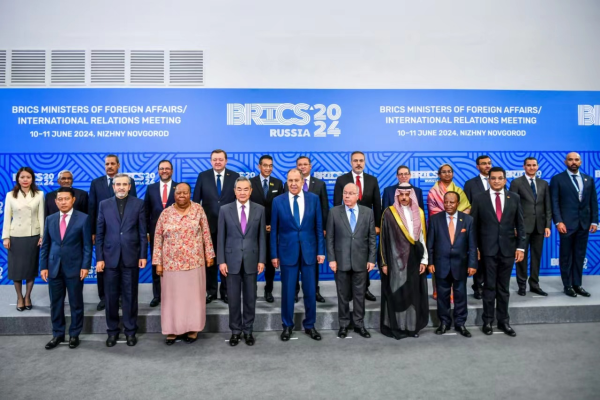NIZHNY: A two-day meeting of foreign ministers belonging to the BRICS of emerging economies has concluded in the Russian city of Nizhny Novgorod, with all parties calling for adherence to multilateralism, improving global governance and increasing the voice and representation of developing countries.
The meeting from Monday to Tuesday marks the first gathering since the group expanded from five members (Brazil, Russia, India, China and South Africa) to nine in January with the addition of Egypt, Ethiopia, Iran, and the United Arab Emirates as official members.

The “BRICS Plus” dialogue at the foreign ministers’ level is held in Nizhny Novgorod, Russia, June 11, 2024.
Countries applaud BRICS mechanism
On Monday, BRICS countries engaged in in-depth discussions on cooperation as well as international and regional hot topics. A joint statement of BRICS foreign ministers was issued following the meeting.
All parties spoke highly of the important role of the BRICS mechanism and the achievements of its membership expansion. They agreed that the accession of more countries to BRICS has accelerated the process of world multi-polarization and promoted a more just and equitable international order. They also voiced support for the establishment of partner countries.
All parties called for adhering to multilateralism, opposing unilateralism and protectionism, promoting reform of the international financial architecture, enhancing and improving global governance, and increasing the voice and representation of developing countries.
All parties emphasized resolving disputes peacefully through dialogue and consultations, and supporting all efforts conducive to the peaceful resolution of crises.
On the second day, a dialogue was held between the BRICS countries and 12 other major developing countries, namely Thailand, Laos, Vietnam, Bangladesh, Sri Lanka, Kazakhstan, Belarus, Türkiye, Mauritania, Cuba, Venezuela and Bahrain.
The participants praised the strategic significance of the dialogue, noting that the BRICS+ model facilitates unity and cooperation among developing countries, enhancing the Global South’s influence and building a more just and reasonable international order.
They called for reforms to the international financial system, enhanced cooperation in the digital economy, infrastructure and other areas, safeguarding the stability of the global industrial supply chain, narrowing the development gap, and achieving shared progress.
China’s voice
Chinese Foreign Minister Wang Yi, also a member of the Political Bureau of the Communist Party of China Central Committee, stressed universal security, common development and global governance at the meetings.
He said BRICS should take the lead in safeguarding the international system with the United Nations at its core, and push for an equal and orderly multipolar world and inclusive economic globalization.
On the Ukraine crisis, Wang reiterated China’s position: China advocates consultation to resolve disputes, calls for immediate, comprehensive and sustainable ceasefire in Gaza, and supports Palestine’s full membership in the UN as well as the two-state solution to realize lasting peace in the Middle East. China also supports the convening of a peace conference recognized by both the Russian and Ukrainian sides, said Wang.
The foreign minister also called for more efforts to build the group into a new type of multilateral cooperation mechanism among emerging markets and developing countries that features openness and inclusiveness. He urged strengthened coordination and cooperation within the group to address the interests of the Global South, promote globalization and maintain the stability of the global industrial and supply chains.
Wang met separately in the two days with Lao Deputy Prime Minister and Foreign Minister Saleumxay Kommasith, Russian Foreign Minister Sergei Lavrov, Brazilian Foreign Minister Mauro Vieira, South African Foreign Minister Naledi Pandor, Ethiopian Foreign Minister Taye Atskeselassie, Iranian Acting Foreign Minister Ali Bagheri Kani and Thai Foreign Minister Maris Sangiampongsa.
Improving global governance
The BRICS mechanism was established by four countries in 2009. In 2010, South Africa was officially invited to join. Over the following decade, the member countries remained stable until four more countries joined in 2024. According to analysts, the recent large-scale expansion of the BRICS mechanism is seen as a move in line with the times, and the group will keep expanding.
In the past decade, the Global South has risen rapidly, leading to a fundamental reversal of global economic power. However, Western countries still want to maintain their dominance in the future international order by relying on allies. Now is the time for the Global South to step onto the international stage, said Wang Youming, director of the Institute of Developing Countries at the China Institute of International Studies.
He said that the expansion of BRICS countries will definitely continue and the expanded BRICS mechanism will play a significant role in creating a more just and equitable global governance system.
Amid the situation where the Western camp continues to monopolize the international order or international power system, only a scaling effect can make the voice of the Global South louder and more influential, said Wang.























